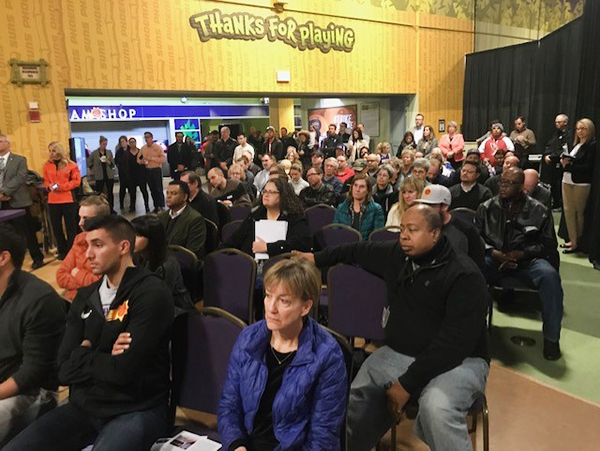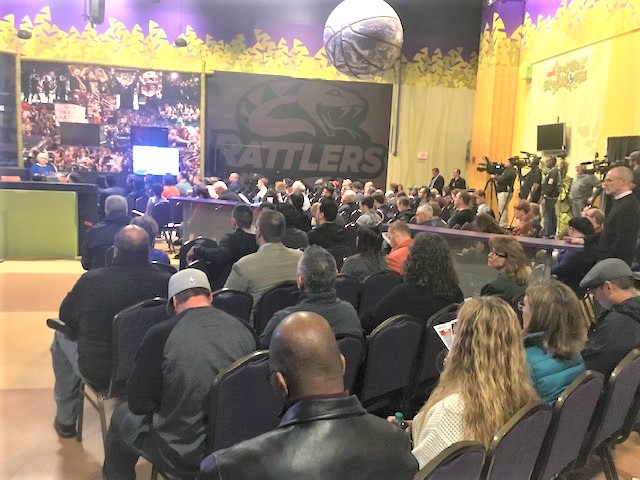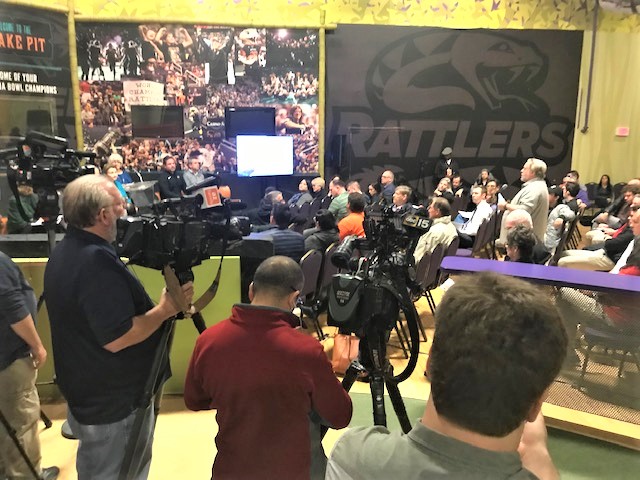
Disclosure: Rose Law Group represents the Phoenix Suns.
Rose Law Group Reporter Staff
Talking Stick Resort Arena on Saturday hosted a community conversation to discuss the city’s proposed renovation of the arena. Around 200 people heard a presentation from Phoenix Economic Development Director, Christine Mackay. Of the 46 citizens who spoke, only seven were in opposition.
Mackay discussed that in 1989, Phoenix adopted a tourism tax that only applies to hotel stays and rental cars, and the city is dedicated to funding the arena and future repairs.
“We [the city] are the landlords of this building, and we own this building… and the building is 27 years old; it needs repairs,” Mackay said.
The major tenant, the Suns, are agreeing to pay for all enhancements and a lot of the repairs. To date, the city has invested $79 million, and the Suns organization has invested $179 million. Additionally, the Suns have paid the city $30 million in lease payments, and they manage the facility.
The proposed deal on the table has the Suns adding an additional $80 million, plus paying for a wholly separate practice facility (the cost is between $25 – 50 million) and paying for any overruns.
Suns President and CEO Jason Rowley let the crowd know the Suns are committed to building the practice facility in Phoenix and they have agreed to an increase in their rent over the next 15 years.
 The city will add a capped amount of $150 million.
The city will add a capped amount of $150 million.
If the city council approves the proposal, the city and the Suns will have an approximate 50/50 split of capital costs for the life of the deal, with the Suns paying more for rent and all operations.
Mackay also explained only 30 percent of all arena events is Suns-related, while community and entertainment events account for 70 percent.
The arena employs 380 full-time workers (not including Suns personnel and team members) and 700 part-time jobs.
The proposed renovation deal requires the Suns to stay 15 years longer than they are required if this is not approved.
Mackay said the arena generates $12.8 million in direct revenue sales tax per year and $182 million in annual economic impact to the city.
“Tourism tax pays for the building, and the arena makes money, and that money flows into the city coffers, which pays for resident services like police and fire,” she said.
Regardless if the Suns play at the arena, the city has to take care of its asset, which is aging and not keeping up with the needs of the community. Such will cost the city at least $150 million and more if the Suns are not in the mix contributing voluntarily.
“It is a city-owned building with or without an anchor tenant. There are no new taxes being imposed, and no change in the current tourist tax,” Mackay said.
(Public comment was taken for about two hours. A few of the comments are included below, and we apologize if we have misspelled any names.)
Molly Wisk wrote the arena is “a sports and entertainment venue. If it is not passed, downtown becomes a ghost town. Baseball is only six months out of the year.”
Once he learned the facts, Fred Linsmyer expressed surprise. “This is a tourist tax to pay for this. I was under the impression that city taxes were paying. Why have a meeting if it’s just for tourists? Why have a meeting?”

The crowd began cheering as he added, “someone should have told Channel 5 to let them know tourist tax is paying for this, not the city of Phoenix taxpayers.”
Chris Camacho, CEO of the Greater Phoenix Economic Council, indicated strong support as he characterized the arena as “the anchor in downtown.”
“A lot of dreams are made here, and I’d like to see that continued,” supporter Carl Gentles said, and noted, public non-profit programs, such as back to school clothing drives, are important.
Darrell Christensen said the arena needs to be upgraded to serve those with disabilities better.
Suns General Manager James Jones, with Suns players, Deandre Ayton, Devon Booker, and Jamal Crawford took a break from practice to attend the meeting.
“This is important to us and to Suns history,” Jones said.
Steve Beitts described the arrangement as a “typical landlord-tenant situation. You do maintenance things to retain a tenant. This is a public asset the city owns and should be an easy decision to make — putting public money into infrastructure and money coming from tourist taxes” is a no-brainer from (my) point of view.
One resident said the arena is a “cultural amenity like a zoo or library; not everyone uses them all, but many use a lot. “
Steven Molina said, “Thank you city for getting to an agreement with the Suns. The city needs to find and maintain the assets they own just like anyone.”
To close, Mayor Thelda Williams noted that long ago there were no activities downtown, but that changed with the arena.
Councilman Michael Nowakowski stressed the economic impact and vibrancy of downtown, and he encourages residents to attend the series of meetings being held later this week.








